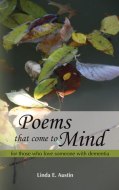All writers need an editor. Even editors need editors. Family-only writings can be held to looser standards, but have a few people read over the manuscript to look for typos and improper grammar and anything that does not make sense, is not clear, or is phrased awkwardly. Friends who don’t know your past very well would make good “beta readers.” After all, the great-great-great grandchildren may someday read your book and you want them—strangers—to understand everything you wrote and not stumble over twisted, rambling sentences.
Yesterday I attended a talk by Suzann Ledbetter Ellingsworth, a writer and editor, or “wreditor” as she calls herself. This woman is a no-nonsense ace editor quick with rapier wit and red pen. She taught us what to hack out of our manuscripts. “Trim the fat, make every word count.” She is passionate about her work—and everyone else’s. I thought she would discuss how to “show me the glint of light on broken glass” per Anton Chekhov’s show-vs-tell admonishment to writers not to tell us the moon is shining. Mostly she showed us how to find useless, distracting words and stab them with that broken glass. And there are a lot of useless, distracting words. When those words are removed or replaced, the showing happens, and the reader becomes more engrossed in the story.
I’ve read several recommended books on how to write. They were disappointingly vague, full of chatter and prompts, without much talk on the technical aspects of writing well. Only Stephen King’s book, “On Writing,” stood out. Mr. King said the most valuable learning experience he ever had as a young writer was when an editor slashed his newspaper article to bits, showing how he could improve his writing. Suzann did that for us Saturday by using examples of common writing language (found even in bestsellers) to explain why they make for wishy washy sentences. And oh, the difference she made by fixing them.
I’m sure you’re dying to know what Suzann said. I’ll give a few examples, using both her and my explanations, but she gave too much advice for me to repeat in this little blog post.
1. Most adverbs are bad. “She went quickly” could be replaced by “She ran” or “She scampered.” Many adverbs are redundant, too, as in “She ran quickly” (running implies speed). “She raced” might be better wording. Use more accurate verbs, or explain the situation better.
2. Remove most instances of the word “that.” The sentence will probably mean the same without the useless pebble in the middle. “The flowers that I held…” become more fragrant as “The flowers I held…” and may be intoxicating as just plain “The flowers…”
3. If you saw something happen, just say what it is. “The car came up the road,” not “I saw the car come up the road.” Not everything should be about you.
4. Size adjectives tend to be meaningless. The dog may be a large brown mutt, but maybe it’s a St. Bernard mix (or he had a dog the size of a St. Bernard). Maybe it’s a Chihuahua (and not a little Chihuahua – redundant!). Let the reader see the dog in her mind. Question: What is a small mountain? Answer: a hill.
5. You are not going to do anything. You did it. “I walked to the store,” not “I’m going to walk to the store,” unless you’re going to walk to the store tomorrow.
Suzann also emphasized using active voice. Passive voice is commonly identified by “ing” verb endings, and the MS Word spell checker usually flags this. Suzann said we often speak using passive voice, but we should write using active verbs, even in dialog. I call this “writing strong sentences.” Not “I had been thinking about that,” but “I thought about that.”
I recently gave a sample edit with explanations to someone who was astonished by all the redlines. He said, “I know this stuff, why couldn’t I see it?” Even writers who know this stuff are blinded because they are too close to their work. Our minds see what we meant to say, and there are just too many ways to write weak sentences. That’s why we all need editors. Usually we all need several proofreaders, too.
You’re welcome to comment on any writing errors or weaknesses in this blog post. If you find any and you are an author or editor, I’ll tweet you some publicity. You’re also welcome to leave your own writing tips in the comments.





Wow, Linda. How I wish I’d been in that room. I’ll bet it was crackling with energy. I hope everyone reads and heeds every tip you shared.
I can certainly attest to your statement that we all need editors. I do editing for others, but even though I used Grammar Check twice (it apparently skipped an amazing number of things the first time through) and four times I did what I thought were FINAL edits, other people found “egregious errors” that I would not have noticed had I read past them a dozen more times. I hope the book is clean now. If not, it won’t be for lack of trying!
If you have the cash, paid editors are a splendid move, but don’t rely on a single pair of eyes to catch every error, even if you ask for a line edit. I recently sent a friend a list of nine substantial errors I found in her professionally edited book. Yes, the more eyes you have involved the better. Find writers groups, online or local and cultivate eagle-eyed friends. They don’t have to be writers to find errors. Please be diligent with writing and editing and help keep the standard of indie publishing high.
P.S. Linda, I did not notice any errors in your post. 🙂
Oh, yes, Sharon! The editor should not be the same person as the proofreader, and the more steely eyes staring through the manuscript the better. We also can make mistakes doing the corrections from the editor. Ugh, so many ways to mess up, and so hard to see errors and lesser problems. Even though you didn’t find any errors here, I’m still going to tweet about your new book, “Writing Compelling Description,” which goes with “The Heart and Craft of Life Story Writing.”
LOL! I had to upload a new Kindle file for The Heart and Craft of Writing Compelling Description because a kind soul pointed out an error I had made fixing another one. Sigh … Fortunately the error was relatively small and not in the print version. Yes, lots and lots of eyes are needed.
Wow, powerful suggestions, Linda.
Pingback: I Wrote My Memoir Already | slashangiton
Reblogged this on "CommuniCATE" Resources for Writers and commented:
If you write and love memoir, this is a must follow blog! Please visit and have a good look around, there are plenty of treasures waiting for you. Enjoy…
Hi Cate, thanks for stopping by and for sharing this blog post. I liked your guest post on Kathy Pooler’s blog and wish I could see that exhibit. Glad to meet someone else who encourages memoir and other types of life writing. I enjoyed checking out your website and blog.
Reblogged this on creativityorcrazy and commented:
Thought I’d share a post I ran across last night. Loved that it gave examples of the “show don’t tell” type writing which somehow eludes my brain. Sometimes I just need things spelled out a little more concretely for me.
Unless you’re talking about computers, this is how it’s spelled, “dialogue”. Great editing advice, thanks!
Aha! Thank you, J.K. Andrews. And I’m not going to fix it because I want everyone to see how hard it is to not make any mistakes. MS Word spell checker did not catch it either (I write my posts in Word first).
Hi Linda, thanks for the blog post, which I came across looking for advice on editing memoirs. By way of feedback, I’d like to tweak your description of the passive voice. The example you give, “I had been thinking about that”, is an example of the past perfect (or pluperfect) tense, not the passive voice. It has a subtly different meaning to “I thought about that” (simple past tense) and there is no reason to avoid it. An example of the passive would be “Death was something I thought about often”, where the emphasis is on the recipient of the action (death) rather than the actor (I). The active form would be “I thought about death often”. (Sorry for the sombre example; it was just the first one that sprang to mind!) Each form is appropriate in different circumstances but it is useful for an editor to be aware of overuse of the passive. All the best.
Thanks, Steve! All those tense names might make the average person’s brain zone out, but the point is that less words involved in a verb make reading easier. But, it’s important not to change meaning, too.
I have a question. How do you find a good (and cheap editor) to help you with this?
Well, KT, good editors don’t come cheap, especially if your writing needs a lot of help. You always want to check an editor’s work first, either through a sample edit of a few of your pages or by going to Amazon and doing a Search Inside of some of the books they say they have edited (and looking at reviews to see if anyone mentions editing issues). If you have a memoir or family history, send me an email through the Contact tab and I might be able to help you out. I can at least look at some of your writing and give you some advice.